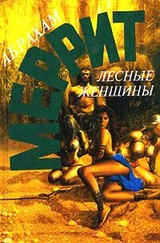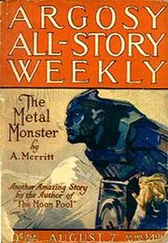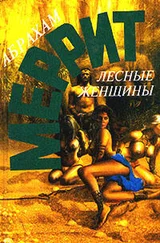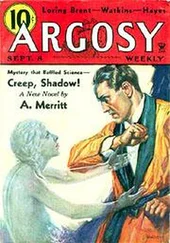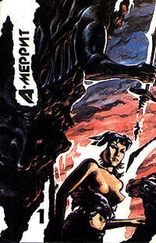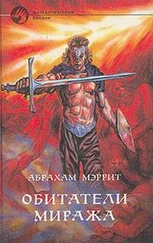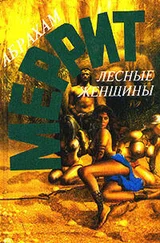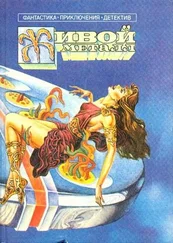Абрахам Меррит - Burn, Witch, Burn!
Здесь есть возможность читать онлайн «Абрахам Меррит - Burn, Witch, Burn!» весь текст электронной книги совершенно бесплатно (целиком полную версию без сокращений). В некоторых случаях можно слушать аудио, скачать через торрент в формате fb2 и присутствует краткое содержание. Год выпуска: 1932, Жанр: Ужасы и Мистика, на английском языке. Описание произведения, (предисловие) а так же отзывы посетителей доступны на портале библиотеки ЛибКат.
- Название:Burn, Witch, Burn!
- Автор:
- Жанр:
- Год:1932
- ISBN:нет данных
- Рейтинг книги:4 / 5. Голосов: 1
-
Избранное:Добавить в избранное
- Отзывы:
-
Ваша оценка:
- 80
- 1
- 2
- 3
- 4
- 5
Burn, Witch, Burn!: краткое содержание, описание и аннотация
Предлагаем к чтению аннотацию, описание, краткое содержание или предисловие (зависит от того, что написал сам автор книги «Burn, Witch, Burn!»). Если вы не нашли необходимую информацию о книге — напишите в комментариях, мы постараемся отыскать её.
Burn, Witch, Burn! — читать онлайн бесплатно полную книгу (весь текст) целиком
Ниже представлен текст книги, разбитый по страницам. Система сохранения места последней прочитанной страницы, позволяет с удобством читать онлайн бесплатно книгу «Burn, Witch, Burn!», без необходимости каждый раз заново искать на чём Вы остановились. Поставьте закладку, и сможете в любой момент перейти на страницу, на которой закончили чтение.
Интервал:
Закладка:
thrust again…stabbing the golden throat of the woman precisely where that other doll had stabbed Braile!
And as Braile had screamed-so now screamed the doll-maker…dreadfully, agonizedly…
She tore the doll from her breast. She hurled it from her. The doll hurtled toward the fireplace, rolled, and
touched the glowing coals.
There was a flash of brilliant flame, a wave of that same intense heat I had felt when the match of
McCann had struck the Peters doll. And instantly, at the touch of that heat, the dolls at the woman's feet
vanished. From them arose swiftly a pillar of that same brilliant flame. It coiled and wrapped itself around
the doll-maker, from feet to head.
I saw the shape of beauty melt away. In its place was the horse-like face, the immense body of Madame
Mandilip…eyes seared and blind…the long white hands clutching at her torn throat, and no longer white
but crimson with her blood.
Thus for an instant she stood, then toppled to the floor.
And at that instant of her fall, the spell that held us broke.
Ricori leaned toward the huddled hulk that had been the doll-maker. He spat upon it. He shouted,
exultantly:
"Burn witch burn!"
He pushed me to the door, pointing toward the tiers of the watching dolls that strangely now seemed
lifeless! Only dolls!
Fire was leaping to them from draperies and curtains. The fire was leaping at them as though it were
some vengeful spirit of cleansing flame!
We rushed through the door, the corridor, out into the shop. Through the corridor and into the shop the
flames poured after us. We ran into the street.
Ricori cried: "Quick! To the car!"
Suddenly the street was red with the light of the flames. I heard windows opening, and shouts of warning
and alarm.
We swung into the waiting car, and it leaped away.
CHAPTER XVIII: THE DARK WISDOM
"They have made effigies comparable with my image, similar to my form, who have taken away my
breath, pulled out my hair, torn my garments, prevented my feet from moving by means of dust; with an
ointment of harmful herbs they rubbed me; to my death they have led me-O God of Fire destroy them!"
Egyptian Prayer
Three weeks had passed since the death of the doll-maker. Ricori and I sat at dinner in my home. A
silence had fallen between us. I had broken it with the curious invocation that begins this, the concluding
chapter of my narrative, scarcely aware that I had spoken aloud. But Ricori looked up, sharply.
"You quote someone? Whom?"
I answered: "A tablet of clay, inscribed by some Chaldean in the days of Assur-nizir-pal, three thousand
years ago."
He said: "And in those few words he has told all our story!"
"Even so, Ricori. It is all there-the dolls-the unguent-the torture-death-and the cleansing flame."
He mused: "It is strange, that. Three thousand years ago-and even then they knew the evil and its
remedy…'effigies similar to my form…who have taken away my breath…an ointment of harmful herbs…to
my death they have led me…O God of Fire-destroy them!' It is all our story, Dr. Lowell."
I said: "The death-dolls are far, far older than Ur of the Chaldees. Older than history. I have followed
their trail down the ages since the night Braile was killed. And it is a long, long trail, Ricori. They have
been found buried deep in the hearths of the Cro-Magnons, hearths whose fires died twenty thousand
years ago. And they have been found under still colder hearths of still more ancient peoples. Dolls of flint,
dolls of stone, dolls carved from the mammoth's tusks, from the bones of the cave bear, from the
saber-toothed tiger's fangs. They had the dark wisdom even then, Ricori."
He nodded: "Once I had a man about me whom I liked well. A Transylvanian. One day I asked him why
he had come to America. He told me a strange tale. He said that there had been a girl in his village whose
mother, so it was whispered, knew things no Christian should know. He put it thus, cautiously, crossing
himself. The girl was comely, desirable-yet he could not love her. She, it seemed, loved him-or perhaps
it was his indifference that drew her. One afternoon, coming home from the hunt, he passed her hut. She
called to him. He was thirsty, and drank the wine she offered him. It was good wine. It made him
gay-but it did not make him love her.
"Nevertheless, he went with her into the hut, and drank more wine. Laughing, he let her cut hair from his
head, pare his finger-nails, take drops of blood from his wrist, and spittle from his mouth. Laughing, he
left her, and went home, and slept. When he awakened, it was early evening, and all that he remembered
was that he had drunk wine with the girl, but that was all.
"Something told him to go to church. He went to church. And as he knelt, praying, suddenly he did
remember more-remembered that the girl had taken his hair, his nail parings, his spittle and his blood.
And he felt a great necessity to go to this girl and to see what she was doing with his hair, his nail parings,
his spittle, his blood. It was as though he said, the Saint before whom he knelt was commanding him to
do this.
"So he stole to the hut of the girl, slipping through the wood, creeping up to her window. He looked in.
She sat at the hearth, kneading dough as though for bread. He was ashamed that he had crept so with
such thoughts-but then he saw that into the dough she was dropping the hair she had cut from him, the
nail parings, the blood, the spittle. She was kneading them within the dough. Then, as he watched, he saw
her take the dough and model it into the shape of a little man. And she sprinkled water upon its head,
baptizing it in his name with strange words he could not understand.
"He was frightened, this man. But also he was greatly enraged. Also he had courage. He watched until
she had finished. He saw her wrap the doll in her apron, and come to the door. She went out of the door,
and away. He followed her-he had been a woodsman and knew how to go softly, and she did not know
he was following her. She came to a crossroads. There was a new moon shining, and some prayer she
made to this new moon. Then she dug a hole, and placed the doll of dough in that hole. And then she
defiled it. After this she said:
"'Zaru (it was this man's name)! Zaru! Zaru! I love you. When this image is rotted away you must run
after me as the dog after the bitch. You are mine, Zaru, soul and body. As the image rots, you become
mine. When the image is rotted, you are all mine. Forever and forever and forever!'
"She covered the image with earth. He leaped upon her, and strangled her. He would have dug up the
image, but he heard voices and was more afraid and ran. He did not go back to the village. He made his
way to America.
"He told me that when he was out a day on that journey, he felt hands clutching at his loins-dragging him
to the rail, to the sea. Back to the village, to the girl. By that, he knew he had not killed her. He fought the
hands. Night after night he fought them. He dared not sleep, for when he slept he dreamed he was there
at the cross-roads, the girl beside him-and three times he awakened just in time to check himself from
throwing himself into the sea.
"Then the strength of the hands began to weaken. And at last, but not for many months, he felt them no
more. But still he went, always afraid, until word came to him from the village. He had been right-he had
not killed her. But later someone else did. That girl had what you have named the dark wisdom. Si!
Читать дальшеИнтервал:
Закладка:
Похожие книги на «Burn, Witch, Burn!»
Представляем Вашему вниманию похожие книги на «Burn, Witch, Burn!» списком для выбора. Мы отобрали схожую по названию и смыслу литературу в надежде предоставить читателям больше вариантов отыскать новые, интересные, ещё непрочитанные произведения.
Обсуждение, отзывы о книге «Burn, Witch, Burn!» и просто собственные мнения читателей. Оставьте ваши комментарии, напишите, что Вы думаете о произведении, его смысле или главных героях. Укажите что конкретно понравилось, а что нет, и почему Вы так считаете.

![Абрахам Меррит - Лунный бассейн [Лунная заводь]](/books/20623/abraham-merrit-lunnyj-bassejn-lunnaya-zavod-thumb.webp)
